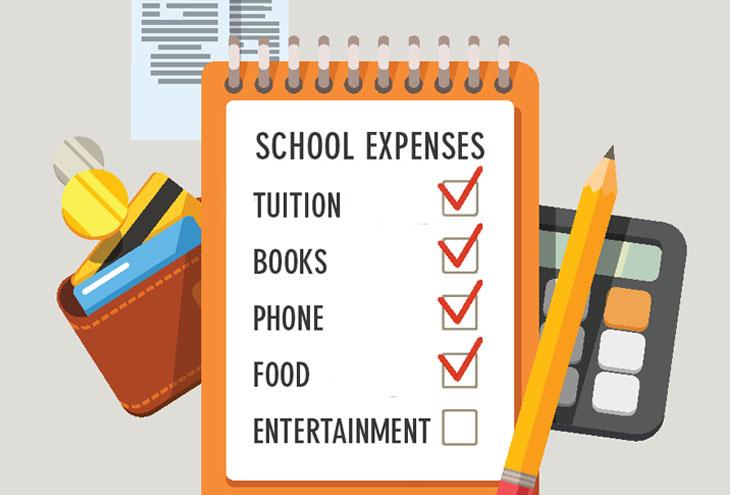Increase your financial savviness in the new year
A new year means … taking charge of your money? Developing a solid financial plan — and sticking to it — can be incredibly helpful while you’re in college and pay dividends long after you graduate. Budgeting doesn’t have to be difficult, and it will help you achieve more freedom in your spending choices. A good budget can mean the difference between a diet of ramen noodles and enjoying wings or even something fancier during a night out with your friends.
The most important step toward financial freedom is to actually make a budget. Your budget doesn’t have to be detailed, but it should account for the expenses you expect during the semester, and allow you some wiggle room in case anything goes wrong. If this sounds complicated, there are plenty of online sites, like Mint and NerdWallet, that have easy, free tools to help you create your budget without much fuss. Group your budget into categories, such as things you have to pay for (tuition, meal plan, books); things it’s important to pay for (cell phone, car); and things you would like to be able to pay for (nights out, special events). Estimate how much each item will cost per month or per semester, and then make sure you have enough funding to cover these expenses.
When it comes to meeting expenses, make sure you have a talk with whoever is helping you finance your college education. If that person is you, then you’re all set. But if there are others paying for parts of your education, be sure you understand at the start of the school year what they’re expecting to pay for. Are they paying tuition and expecting you to fund room and board? Are they paying for your textbooks or your cell phone? You also need to confirm other sources of income, such as a job or financial aid. Take time to outline all the funds available to you and what they are going toward, then determine what you’d like to do with any money that happens to be left over.
Always set some money aside for a rainy day. You never know when an unanticipated expense is going to come along and blow your budget apart. We’ve all experienced these frustrating — and costly — events. Maybe your computer crashed while you were in the middle of writing an important paper, or you twisted your ankle during a pickup basketball game had to go to the emergency room. You’ll want to make sure you budget for the unexpected.
Save money wherever and whenever you can. Don’t forget that students have access to great discounts both on and off campus. Many local businesses, restaurants, movie theaters, and museums offer student discounts. Take advantage of these fun things to do that cost little or no money.
If you have a credit card, use it sparingly. In college, it’s easy to swipe your card for everything from that $5 latte at Starbucks to your $300 science textbook. But think about how and when it makes the most sense to use your card. College can be a great time to start building credit, but you also don’t want to go into debt. In addition to paying off the bill in full each month, consider creating a rule around when you use your card. For example, maybe you use your credit card only for purchases over $100. Or you use your card only until you’ve hit a certain dollar amount each month. These safeguards allow you the flexibility to use a credit card while protecting you from creating mountains of debt.
If budgeting is going well, consider putting more money into a savings or checking account. Those additional funds will come in handy after you graduate. Continue your budgeting after graduation to ensure you’re on the path to financial success.
For many college students, the most challenging aspect of a budget is actually sticking to it. Don’t look at a budget as just another project or homework assignment, look at it as a way to allow you to cover your expenses while also having some fun, and as a way to set you up for financial stability after you graduate. If you can create and stick to a budget in college, you’ll be on solid ground for many years to come.

Wyatt Jewett, Cheyenne River Lakota, is a sophomore at Columbia University in New York City majoring in psychology. Here he shares a few insights based on his own experience managing money as a student.
Have you ever created a budget for yourself? What did it involve?
I’ve never generated a formal budget, but I’ve always found ways to keep track of my income and expenditures. I have short-term, long-term, and unforeseen expenditures like most people. A short-term expenditure may be going out to explore New York City and seeing what it has to offer, so I’ll save money that week for a day away from my schooling. A long-term expenditure may be my student contribution for my schooling that I have to save up for or get scholarships to pay for. Then, I always budget for unforeseen expenditures just in case I need a little extra money for spontaneous things, such as going to a basketball game or eating a meal away from the dining halls.
Do you take advantage of any online tools or apps for tracking your spending or to help with saving?
To track my spending I use my banking app, which lets me check up on how much money is put into, or taken out of, my account. It also lets me review the dates and times when my transactions were made. This tool has been handy for me because since I use my debit card and don’t visually see how much money I’m spending, sometimes I get carried away. Having a tool to keep track of how much is spent may not be needed for everyone, but I believe keeping track of your money will benefit even the most precise people in the long run. When I first started using a debit card, my father suggested I use a small ledger to keep track for myself, and that was a good old-fashioned tool that helped me save as well.
Did you enter college with at least a basic understanding of personal finances (via either discussions with family members or a high school class)?
Luckily for me, personal finances was a required class for everyone at my high school. It taught me everything I needed to know, from opening a bank account, to building credit, to mortgaging a house — and even eventually paying for my own funeral. It was a very useful class that filled in some of the gaps left from discussions with family members.
Are there any budgeting/money skills you wish you had learned earlier?
One thing that I wish I knew earlier is how many transfers I can make every month. One way I tried saving money was by having my income sent to my savings account and then transferring money to my checking account when I needed it, so I could see how much I spent. I did not know I could make only six transfers on my banking app in one month, so I was in a tough situation. Things worked out because my father was able to go to the bank and transfer some money for me, but I’d recommend checking on that type of thing before getting yourself stuck like I did.
Does your school offer financial literacy programs or services for students who might be struggling from paycheck to paycheck (or between financial aid disbursements)?
My school does offer financial literacy programs at the beginning and the end of the school year. I haven’t personally used them yet, but that’s one thing I may look into. I don’t know it all, and I’d definitely like to learn more.
What tips would you give to fellow students who are finding it difficult to manage their money?
- Don’t spend what you don’t have.
- Use a debit card to track your spending. It’s much easier to track your spending if you use a single source for every purchase. If you do need to use a credit card — most of us do at some point — be sure to pay it off in full every month.
- Save for emergencies. You never know when something will come up, and it’s a good feeling to know you can survive for a period of time without earning an income.
- Reach out to campus resources. They are paid to help you; use them!
- Don’t be afraid to ask questions, whether of a campus resource or your banking institution.
- Talk to your parents or guardians, and even your peers if you are comfortable. They may have great insight into some things you haven’t thought about.
- Always read the fine print, especially when purchasing things online.
Do you have any additional comments?
Money management can be one of the harder things in life, but the resources are there no matter where you are. Lastly, you do not need money to enjoy yourself, live life, and do your best!














